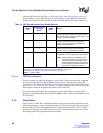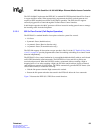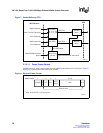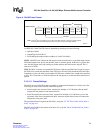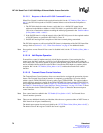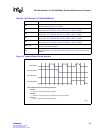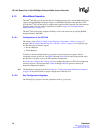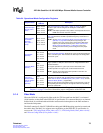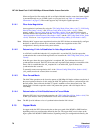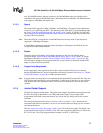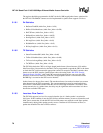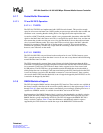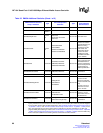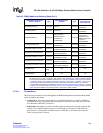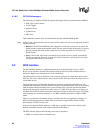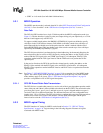
IXF1104 Quad-Port 10/100/1000 Mbps Ethernet Media Access Controller
76 Datasheet
Document Number: 278757
Revision Number: 007
Revision Date: March 25, 2004
When configured for fiber mode, the full set of Optical Module interface control and status signals
is presented through re-use of GMII signals on a per-port basis (see Table 4.5 “Multiplexed Ball
Connections” on page 57). Fiber mode supports only full-duplex Gigabit operation.
5.1.4.1 Fiber Auto-Negotiation
Auto-negotiation is performed by using the “TX Config Word ($ Port_Index + 0x17)", “RX Config
Word ($ Port_Index + 0x16)", and “Diverse Config Write ($ Port_Index + 0x18)". When
autoneg_enable (“Diverse Config Write ($ Port_Index + 0x18)") is set, the IXF1104 performs
hardware-defined auto-negotiation with the “TX Config Word ($ Port_Index + 0x17)" used as an
“Auto-Negotiation Advertisement ($ Port Index + 0x64)" and the “RX Config Word ($ Port_Index
+ 0x16)" used as an “Auto-Negotiation Link Partner Base Page Ability ($ Port Index + 0x65)".
Note: While the MAC supports auto-negotiation functions, the IXF1104 does not automatically configure
the MAC or other device blocks to be consistent with the auto-negotiation results. This
configuration is done by the user and system software.
5.1.4.2 Determining If Link Is Established in Auto-Negotiation Mode
A valid link is established when the AN_complete bit is set and the RX_Sync bit reports that
synchronization has occurred. Both register bits are located in the “RX Config Word ($ Port_Index
+ 0x16)".
If the link goes down after auto-negotiation is completed, RX_Sync indicates that a loss of
synchronization occurred. The IXF1104 restarts auto-negotiation and attempts to reestablish a link.
Once a link is reestablished, the AN_complete bit is set and the RX_Sync bit shows that
synchronization has occurred.
To manually restart auto-negotiation, bit 5 of the “Diverse Config Write ($ Port_Index + 0x18)”
(AN_enable) must be de-asserted, then re-asserted.
5.1.4.3 Fiber Forced Mode
The MAC fiber operation can be forced to operate at 1000 Mbps full-duplex without completion of
the auto-negotiation function. In this mode, the MAC RX path must achieve synchronization with
the link partner. Once achieved, the MAC TX path is enabled to allow data transmission. This
forced mode is limited to operation with a link partner that operates with a full-duplex link at
1000 Mbps.
5.1.4.4 Determination of Link Establishment in Forced Mode
When the IXF1104 is in forced mode operation, the “RX Config Word ($ Port_Index + 0x16)” bit
20 RX Sync indicates when synchronization occurs and a valid link establishes.
Note: The RX Sync bit indicates a loss of synchronization when the link is down.
5.1.5 Copper Mode
In copper mode, the IXF1104 transmits data on the egress path of the RGMII or GMII interface,
depending on the port configuration defined by the user. The copper MAC receives data on the
ingress path of the RGMII or GMII interface, depending on the port configuration defined by the



